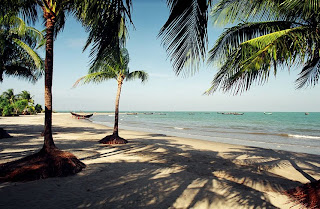

The name Kuakata originated from the word kua, which means a well dug for drinking water. It is believed that the early RAKHAIN settlers found it difficult to get fresh drinking water in the place and they had to dig (kata) wells (kuas) to solve the problem. The beach at Kuakata is 18km long and 3km wide.

On the eastern end of the beach is Gangamati Reserved Forest, an evergreen mangrove forest and snippet of the original Kuakata. When the Rakhines settled in the area in 1784, Kuakata was part of the larger Sundarbans forest. The Sundarbans is now a distant one-hour by speedboat. As a mangrove forest, Gangamati, like the Sundarbans, offers some protection against tidal surges, however it too is being threatened by logging and deforestation. The best way to reach the forest is by foot or bike along the beach, where a flock of flag flying fishing boats can be seen trawling the coast. Choosing to visit Gangamati in the late afternoon is a perfect time to watch the sun caste shadows on the abstract exposed mangrove roots.



This sandy beach slopes into the BAY OF BENGAL. Other attractions at Kuakata include blue sky, huge expanse of water, the evergreen forest in surrounding areas, rows of COCONUT trees, BOATs of many different kinds and their colourful sails, and surfing waves. Kuakata is also a sanctuary for migratory winter birds.


Many people visiting Kuakata find interest in the Buddhist temples located at nearby places such as Keranipara, Misripara, and Amkholapara, while many others find the place interesting because of the unique customs and traditions of the Rakhain community. Kuakata is also a place of pilgrimage of Hindus and Buddhists. Devotees arrive here during the festivals of Rash Purnima and Maghi Purnima. A major ritual on these occasions is dipping in the holy waters of Kuakata. Visitors also enjoy the traditional fairs organised to mark these celebrations.



Fisherman village is another place where you can visit and watch the lifestyle of the fisherman. If you are adventurous you may also go for fishing on the fishing boat if you can manage the local fishermen. That will give you pleasure and experience, which you won’t be able to gather from anywhere else. In the fishermen village you will find the fishermen coming back from the sea and you can purchase some fresh hilsha fish from them, and by the side of village there are some local restaurants where you can get the Hilshas cooked and ready for eating.



The government and local business owners have made significant developments over the years to attract tourist to its shores. Now a days, local people are more supportive to the tourists and communications have improved significantly. A new Police station was built in 2007. Accordingly, the law and order situation in the open beach, even at night, has improved significantly.








 ৮:৪১ PM
৮:৪১ PM
 Alamgir7pha
Alamgir7pha